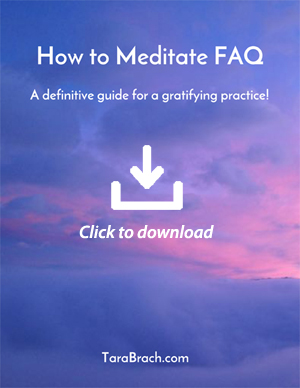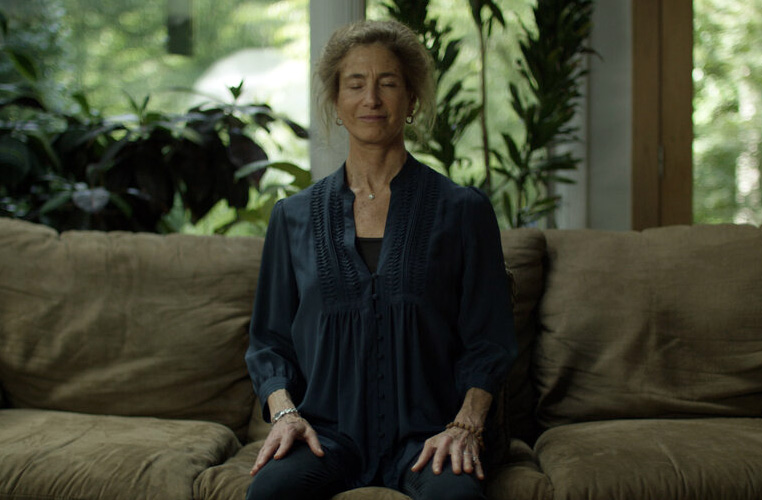At the end of a daylong meditation workshop, Pam, a woman in her late sixties, drew me aside. Her husband, Jerry, was near death after three years of suffering from lymphoma. “I wanted so much to save him,” she told me. “I looked into ayurvedic medicine, acupuncture, Chinese herbs, every alternative treatment I could find, tracked every test result . . . We were going to beat this thing.” She sat back wearily in her chair, shoulders slumped. “And now I’m keeping in touch with everyone, giving updates, coordinating hospice care. If he’s not napping I try to make him comfortable, read to him . . .”
I responded gently, “It sounds like you’ve been trying really hard to take good care of Jerry . . . and it’s been very busy.” At these words, she gave me a smile of recognition. “Hmm, busy. That sounds crazy, doesn’t it?” She paused. “As far back as I can remember I’ve really been busy. But now . . . well, I just can’t sit back and let him go without a fight.”
Pam was silent for a few moments, then looked at me anxiously. “He could die any day now, Tara. Isn’t there some Buddhist practice or ritual that I should learn? Is there something I should be reading? How can I help him with this . . . with dying?”
“Pam,” I said, “you’ve already done so much . . . but the time for all that kind of activity is over. At this point, you don’t have to make anything happen, you don’t need to do anything.” I waited a moment and then added, “Just be with him. Let him know your love through the fullness of your presence.”
At this difficult time I was calling on a simple teaching that is central to my work with my meditation students and therapy clients: It is through realizing loving presence as our very essence, through being that presence, that we discover true freedom. In the face of inevitable loss, this timeless presence brings healing and peace to our own hearts and to the hearts of others.
“In those most difficult moments,” I suggested, “you might pause and recognize what you are feeling—the fear or anger or grief—and then inwardly whisper the phrase ‘I consent.’” I’d recently heard this phrase from Father Thomas Keating, and thought that as a Catholic, Pam might find it particularly valuable. Saying “I consent,” or as I more frequently teach, “yes,” relaxes our armoring against the present moment and allows us to meet life’s challenges with a more open heart.
Pam was nodding, but she had an intent, worried look. “I want to do this, Tara, but when I’m most upset, my mind speeds up. I start talking to myself . . . I talk to him . . . How will I remember to pause?”
“You probably will forget, at least some of the time,” I said, “and that’s totally natural. All you can do is have the intention to pause, the intention to feel what is going on and ‘let be.’” Pam’s face softened with understanding. “That I can do. I can intend, with all my heart, to be there for Jerry.”
A month after my conversation with Pam, she called to tell me what had happened after the workshop. She acknowledged that, even in those final weeks of her husband’s life, she had struggled with the urge to be busy, to find ways to feel useful. She shared that, one afternoon, Jerry began talking about having only a short time left, and about not being afraid of death. She bent over, gave him a kiss, and said quickly, “Oh dear, today’s been a good day, you seemed to have more energy. Let me make you some herbal tea.”
He fell silent, and the quietness shook her. “It became so clear to me in those moments that anything other than listening to what was really going on—anything other than being fully present—actually separated us … I avoided reality by suggesting a cup of tea. But my attempt to steer away from the truth took me away from him, and that was heartbreaking.”
While Pam boiled water for tea, she prayed, asking that her heart be fully present with Jerry. This prayer guided her in the days that followed. During those last few weeks, Pam said she had to keep letting go of all of her ideas about how her husband’s dying should be and what else she should be doing, and just remind herself to say “I consent.”
At first she was mechanically repeating the words, but after a few days she felt as if her heart actually started consenting. When her gut tightened with clutches of fear and feelings of helplessness, she’d stay with those feelings, consenting to the depth of her vulnerability. When the restless urge to “do something” arose, she’d notice that and be still, letting it come and go. And as the great waves of grief rolled through, she’d again say, “I consent,” opening to the huge aching weight of loss.
This intimate presence with her inner experience allowed Pam to fully attend to Jerry. As she put it, “When all of me was truly consenting to the fear and pain, I knew how to take care of him. I sensed when to whisper words of encouragement or just listen, ways to reassure him with touch . . . how to sing to him, be quiet with him. How to be with him.”
Before she ended the call, Pam shared with me what she considered to be the gift of her last days with Jerry, the answer to her prayers: “In the silence, I could see past a sense of ‘him’ and ‘me.’ It became clear that we were a field of loving—total openness, warmth, light. He’s gone, but that field of loving is always with me. My heart knows that I came home . . . truly I came home to love.”
Pam’s willingness to be present with her inner life, no matter how painful, made it possible for her to connect with the vastness of love. Her growing capacity for staying with the truth of her moment-to-moment experience, for embracing the true refuge of presence, enabled her to find her way home, even in the midst of great loss.
Adapted from True Refuge – Finding Peace and Freedom in your Own Awakened Heart (Bantam, Feb, 2013)
For more information on Tara Brach go to: www.tarabrach.com


